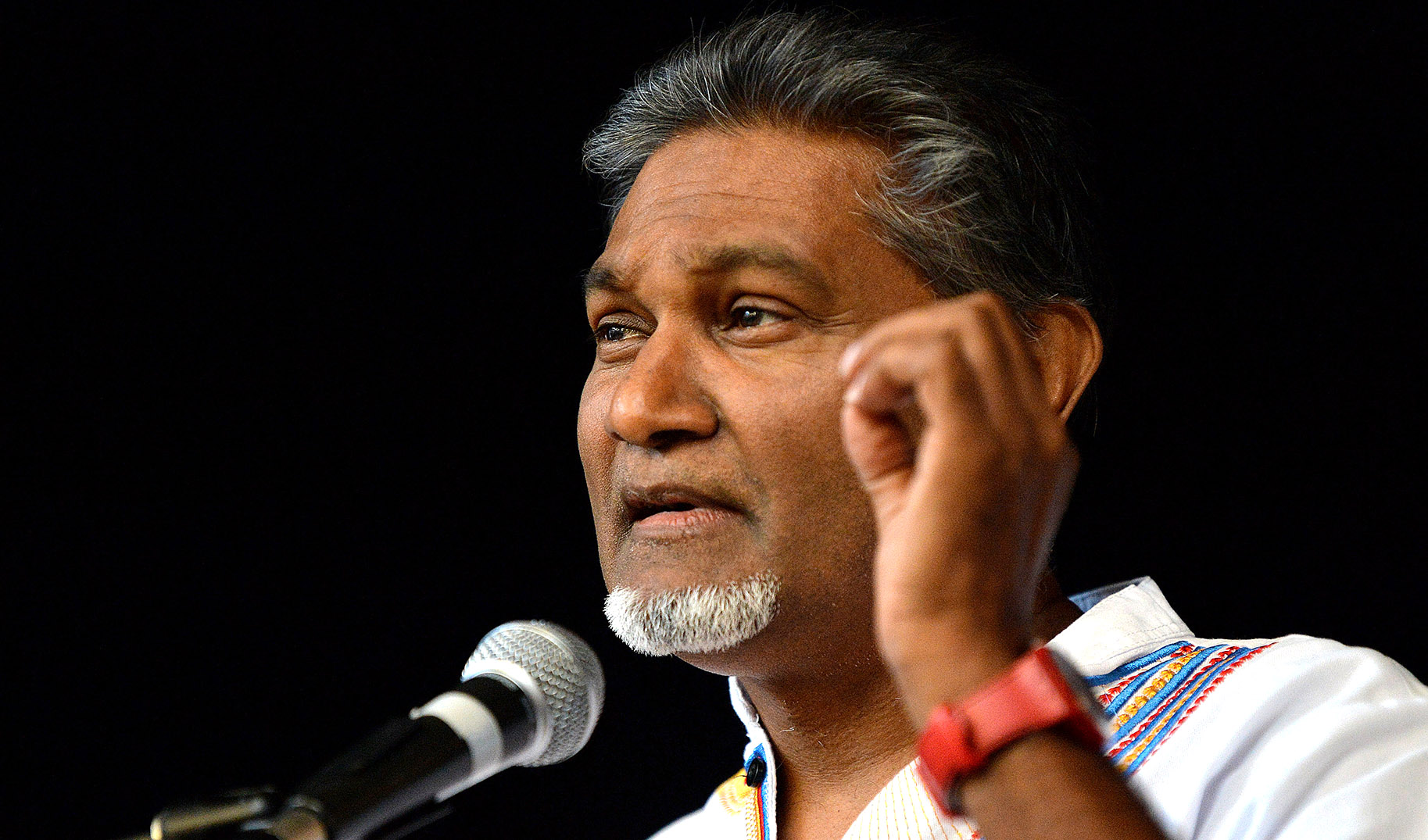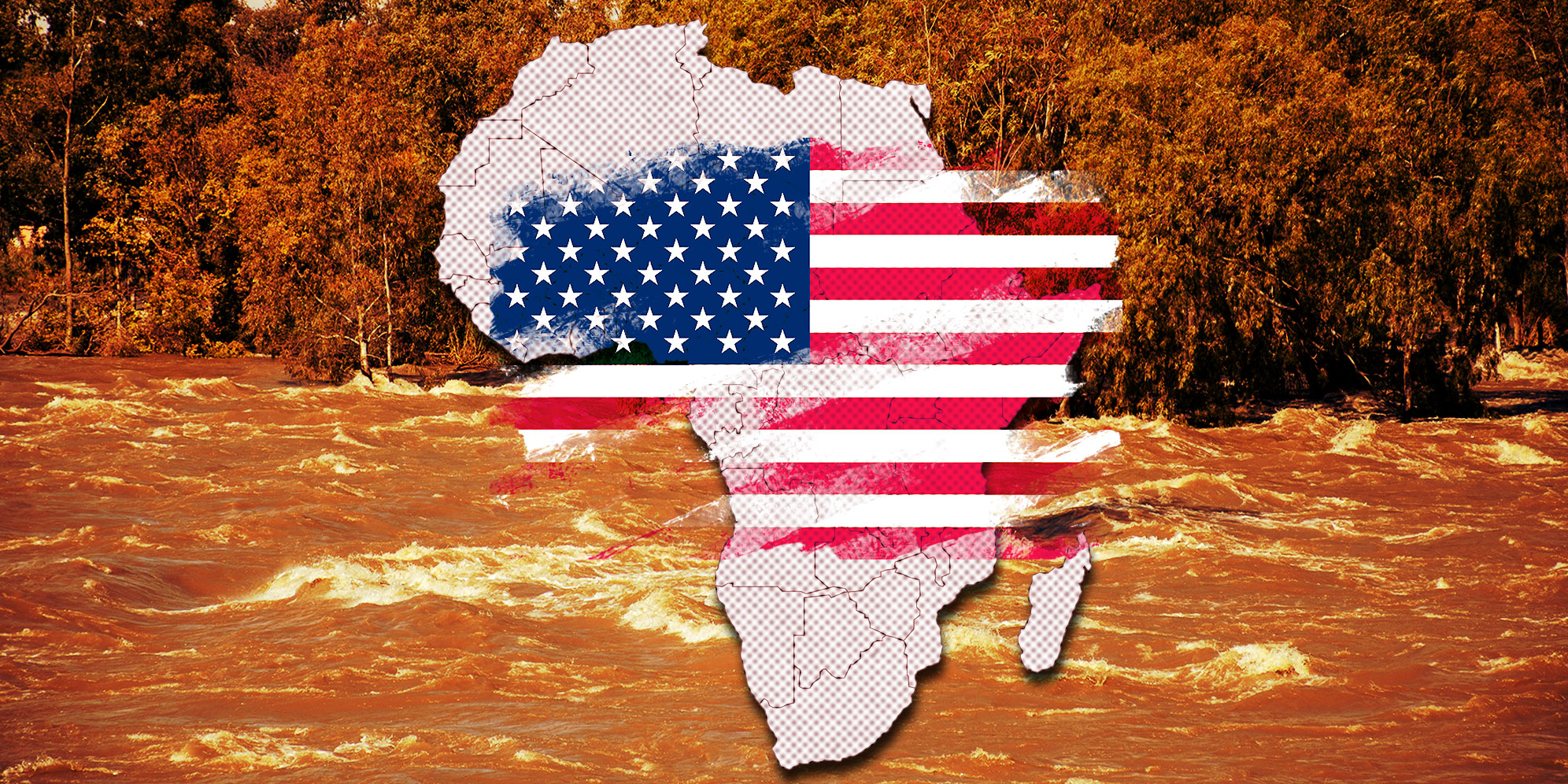As the US exits the Paris Agreement (again) under the Donald Trump administration, the global climate landscape faces a seismic shift. For Africa, and South Africa in particular, this move raises urgent questions about access to climate finance, the balance between adaptation and mitigation and the broader dynamics of international cooperation in the climate space.
“What has happened since Paris [in 2015] has been a roller-coaster ride. If I had to single out one country that has done a little bit more than some others, [in] engineering this roller coaster, it will be the United States,” said Dhesigen Naidoo, senior research associate on climate risk and human security at the Institute for Security Studies (ISS), responding to Daily Maverick.
 Dhesigen Naidoo, senior adviser and climate adaptation lead on the South African Presidential Climate Commission. (Photo: Deon Ferreira)
Dhesigen Naidoo, senior adviser and climate adaptation lead on the South African Presidential Climate Commission. (Photo: Deon Ferreira)
This was during a discussion hosted by the ISS on Tuesday, 13 May 2025 on the prospects for Africa after the US exited the Paris climate agreement for the second time.
Moderated by Kgaugelo Mkumbeni, Research Officer for Climate Risk and Human Security at the ISS, also on the panel were David Martinon, Ambassador of France to South Africa; Benedicto Filho, Ambassador of Brazil to South Africa; and Nomthandazo Mabena, a Fellow at Powershift Africa. They unpacked what this move meant for the climate future of Africa, and especially of South Africa.
Africa is among the continents least responsible for historical greenhouse gas emissions, yet it is disproportionately vulnerable to climate change impacts.
The Paris Agreement, adopted in 2015, was a landmark accord aiming to limit global temperature rise and mobilise substantial financial flows from developed to developing nations for both mitigation (reducing emissions) and adaptation (coping with climate impacts).
The US, as one of the world’s biggest emitters and a major source of climate finance, played a pivotal role in shaping and supporting the agreement. Its exit, therefore, is not just symbolic, but has tangible consequences for Africa’s climate ambitions and resilience strategies.
A decade after the accord’s adoption, the panellists in the discussion looked at how weakened global diplomacy threatens Africa’s access to climate finance ahead of COP30 in Brazil. With adaptation needs mounting, can the continent chart a path to green resilience on its own terms?
As Naidoo put it, climate change isn’t waiting for us to figure out the right course of action.
In 2024, the average global temperature rise already exceeded 1.5°C, a level we had originally aimed to reach only by the end of this century. What were once considered rare events, such as floods occurring once every 120 years, are now happening annually and in some areas even multiple times a year.
This is a widespread reality; extreme weather is no longer confined to certain regions, but is affecting every part of the world.
Read more: Warmest decade on record leaves trail of misery across Africa
Fallout of US climate exits so far
Responding to Daily Maverick in the discussion, Naidoo said that the withdrawal of the US from the Paris Agreement was a significant move and one that did not occur in isolation.
Naidoo said the US had already announced its withdrawal from the Just Energy Transition (JET) partnerships – not only in South Africa – which meant that a potential funding pipeline was no longer there.
In addition, Naidoo said there was also the pressure that the US would put on oil and gas players to increase investments in oil and gas, at a time when the world could not afford more fossil fuel projects, given the urgency of climate change and the costs associated with continued reliance on fossil fuels.
“But here’s the bottom line around this, although in the short term the numbers will be significant, without a doubt there is a general absence of the things that I think we are really worried about,” said Naidoo.
One of the most pressing concerns is the impact on climate finance. The US withdrawal from the Paris Agreement and its associated Just Energy Transition Partnerships, including those with South Africa, means a potential loss of funding for clean energy and adaptation projects.
This is especially significant given the continent’s reliance on external finance to support its transition to low-carbon economies and to build resilience against climate shocks.
However, the feared domino effect, where other partners would also withdraw, has not materialised. Instead, Naidoo said there has been a diversification of support, with new partners stepping in to fill some of the gaps left by the US.
Another concern was that there would be policy manoeuvring inside the multilateral development banks around their financing of energy transition and climate resilience projects.
This, too, has not happened, and this, Naidoo said, was an arena where the United States administration had “gigantic influence”.
He said multilateral development banks and commercial banks had so far maintained their commitments, and there had been no significant rollback of domestic US investments in renewables, such as those under the Inflation Reduction Act.
“So what we’re looking at here, and maybe it’s early days, is that this cascading effect that was possible has not happened. So there is some short-term inconvenience, but it looks like longer-term sustainability is still more than practical. This is something I think we can bank on,” said Naidoo.
Shifting priorities amid geopolitical tensions
Central to the discussion was that the US exit came as global climate action was already hampered by geopolitical tensions.
With both the US and China – the two biggest emitters – reluctant to accelerate mitigation, the focus for Africa is increasingly shifting towards adaptation.
The sentiment from the speakers was that without robust mitigation from the biggest polluters, Africa had to prioritise building resilience to climate impacts that were now unavoidable.
The speakers said that adaptation, long underfunded and under-prioritised, was now more urgent than ever. The challenge was not just about the quantity of finance, but also its quality: much of the available funding was in the form of debt, not grants, raising concerns about the growing debt burden on African countries.
With 2024 being the warmest year on record, Mabena said that at this rate, African countries had one common interest – mitigation and adaptation.
“It is time for our national governments to prioritise domestic resource mobilisation. In that way, it will enable us to invest in the already under way processes of energy transition and ensure that there is an efficient energy supply towards the African countries,” she said.
Complexities of the energy transition
Transitioning to low-carbon energy sources is not a straightforward path for Africa. The continent’s energy mix is diverse and solutions must be tailored to local contexts. While there is excitement about new technologies, there are also concerns about their long-term viability.
Moreover, the transition itself is not without risks. There are fears that competition for resources, such as water for hydropower or critical minerals for batteries, could exacerbate existing tensions or even trigger new conflicts, as seen in disputes over the Grand Ethiopian Renaissance Dam.
African countries are increasingly looking to one another, and to the Global South, for solutions. Brazil’s experience with hydropower and biofuels, for example, offered lessons for African countries with similar resources.
However, as Brazilian Ambassador to SA Benedicto Fonesca Filho noted, not all solutions were universally applicable, and cooperation efforts were often limited by financial and institutional capacity.
Nuclear energy, too, has long been a topic of discussion for Africa’s future energy mix. While it offers a low-carbon alternative, it comes with its own set of challenges, including high costs, safety concerns and the need for robust regulatory frameworks.
French Ambassador Martinon said “we need globally to get out of coal. That is an absolute certainty. We know that for South Africa, it’s a particular challenge for economic and also probably political and symbolic reasons, because we know the fact that coal is seen as a treasure by many politicians in South Africa and by the mining communities.”
But Martinon said that on the part of the European Union, there would be no backing down in terms of the Paris Agreement objectives and supporting African nations.
“In southern Africa, there is an incredibly high potential for building entirely decarbonised energy in South Africa, in Malawi and Lesotho. Lesotho, for example, could very quickly become a powerhouse in terms of entirely decarbonised energy,” Martinon said.
Brian Mantlana, the CSIR’s holistic climate change impact area lead, said that what stood out from the discussion was the theme of multilateralism. He said that while it was often described in various ways, what stood out was that something significant was shifting, and people needed to take note.
“Some described it as being ‘under attack’ but the comment that struck me most came from (the ISS’s) Kgaugelo (Mkumbeni), who said, almost in passing, ‘Trust is fragile to me.’ That’s where we are currently with multilateralism. There’s little trust between countries currently, that is an elephant in the room for me,” said Mantlana.
Despite the setbacks, there was a sense of cautious optimism among leaders and experts. The absence of a cascading withdrawal by other partners, continued investment in renewables and the emergence of new alliances suggest that the momentum for climate action can be sustained, even without US leadership.
“Nobody has put on the table a vision for a sustainable, high-carbon future. It’s just not possible. You can delay it. You cannot have an alternative. There’s only one direction to go,” said Naidoo. DM
https://www.youtube.com/watch?v=REeWvTRUpMk




 Dhesigen Naidoo, senior adviser and climate adaptation lead on the South African Presidential Climate Commission. (Photo: Deon Ferreira)
Dhesigen Naidoo, senior adviser and climate adaptation lead on the South African Presidential Climate Commission. (Photo: Deon Ferreira) 